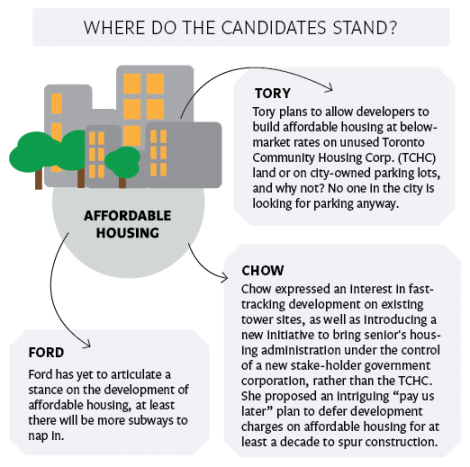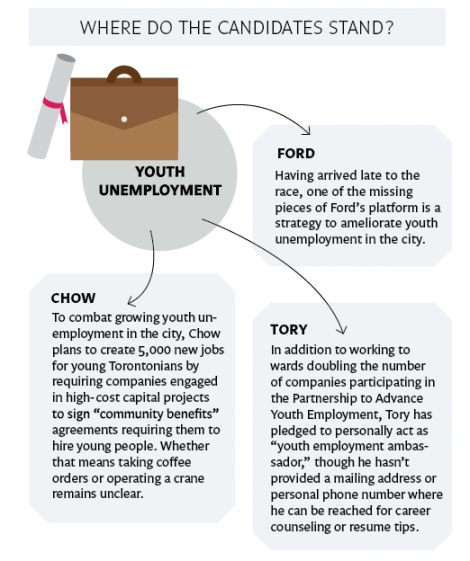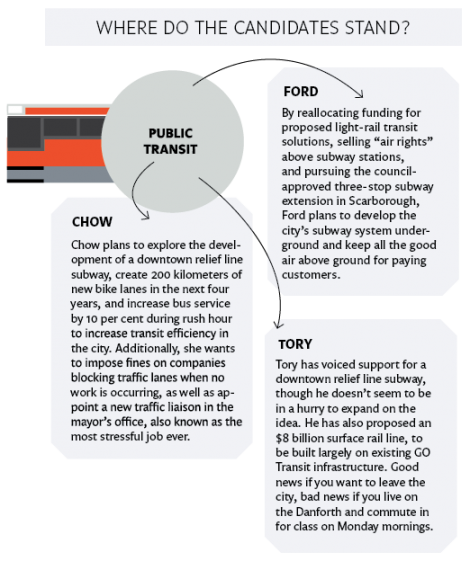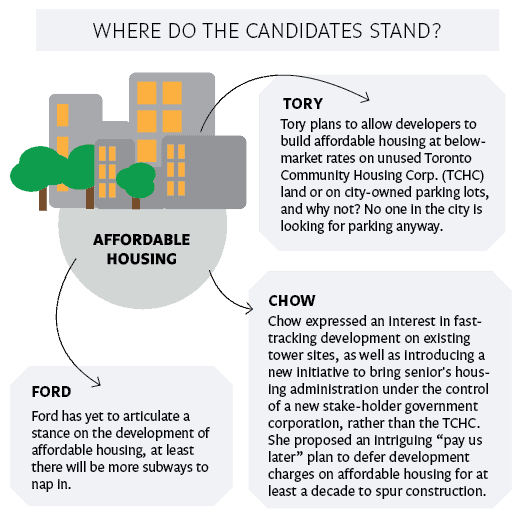On October 27, Torontonians will head to the polls to select the city’s new mayor. In a highly competitive and nationally scrutinized electoral race marred by scandal and lacking in substance, student issues have been disturbingly absent from the headlines and scarcely discussed by the candidates. The minimal discourse, however, should not discourage students from getting informed and voting on election day. Students and young people generally are major stakeholders in this election and ought to show up to the polls to vote for the candidate they believe is best prepared to tackle the issues that matter most to them. Chief among the electoral concerns for students are the need for improving the city’s transit infrastructure, further developing affordable housing in the downtown core, and increasing employment opportunities for youth.
If these concerns are neglected, living as a young person in Toronto will become increasingly difficult. The city prides itself on its culture and educational centres, but in order to keep these elements strong and competitive, it is imperative that Toronto do more to accommodate youth. Our next elected mayor will have to create both short- and long-term plans in order to rectify these areas which, in their present state, are holding youth, and by extension, the city, back.
AFFORDABLE HOUSING
The significant dearth of affordable housing options in the city should be among the first priorities for whichever of the major candidates is successful in this month’s election. The strain this deficiency imposes on students in particular should be of concern to the next elected mayor as, every year, a large fraction of University of Toronto’s students struggle to find a place to live near campus.
The country’s largest metropolis is ground zero for the pervasive and increasing income gap as the city develops as Canada’s financial capital. This growing wealth disparity is responsible for leaving as many as 77,000 Toronto households in struggling low-income communities as they wait for affordable housing. For prospective and recent university graduates still battling a stagnant economy and navigating a highly competitive job market, the possibility of owning a home in the Toronto area remains frighteningly unrealistic.
 An Ipsos Reid report showed that 90 per cent of Torontonians feel that the cost of living in the city is becoming untenable for the average earner. One doesn’t need to look any further than the reported number of individuals relying on Toronto Community Housing Corporation (TCHC) services, which is upwards of 58,500 households, to appreciate the severity of the city’s housing crisis.
An Ipsos Reid report showed that 90 per cent of Torontonians feel that the cost of living in the city is becoming untenable for the average earner. One doesn’t need to look any further than the reported number of individuals relying on Toronto Community Housing Corporation (TCHC) services, which is upwards of 58,500 households, to appreciate the severity of the city’s housing crisis.
Low to moderate-income renters bare the brunt of Toronto’s affordable housing crisis, with the majority of students falling into this category. Since 2002, the gap between average monthly income and rent in low to moderate-income housing has increased by 20 per cent, leaving Torontonians, and particularly students, fighting to make rent. Toronto needs a mayor who will not only address the city’s current housing predicament, but who will work to create long-term development plans to ensure that, as the city grows, it remains financially accessible to young people and won’t require them to compromise on their living conditions.
YOUTH UNEMPLOYMENT
According to a 2013 report by the Canadian Centre for Policy Alternatives (CCPA), Toronto’s youth employment rate, at 43.5 per cent, is the worst in all of Ontario. As of August 2014, youth unemployment in Toronto stands at 19.7 per cent.
Many U of T students applied to and enrolled in university based on the assumption that a premier education necessarily improves their chances of securing gainful employment in the future. These numbers demonstrate that this trajectory is no longer guaranteed, especially in the city.
 The reasons for Toronto’s relative underperformance in youth employment are varied and complex. The city’s status as a global financial hub, as well as the prevalence of unpaid internships, are both listed in the report as possible causes for the deficiency. However, the report concludes that, without localized data, it is difficult to pinpoint the causes of Toronto’s youth unemployment problem.
The reasons for Toronto’s relative underperformance in youth employment are varied and complex. The city’s status as a global financial hub, as well as the prevalence of unpaid internships, are both listed in the report as possible causes for the deficiency. However, the report concludes that, without localized data, it is difficult to pinpoint the causes of Toronto’s youth unemployment problem.
The new mayor of Toronto should address youth unemployment immediately by putting the issue on the agenda at City Hall and taking meaningful action to remedy the situation. As some candidates have suggested, creating jobs through strategic partnerships and city projects, incorporating job creation for youth into the city budget, and improving municipal youth employment services would all go a long way towards employing upcoming generations in the city. Furthermore, the mayor should launch an investigation into the local causes of chronic youth unemployment in the city with a view towards implementing more effective programs and policies, equipped with a clearer understanding of the problem.
PUBLIC TRANSIT
In addition to those issues listed above, the city’s incoming mayor is faced with the trying task of ameliorating Toronto’s public transit infrastructure. The Toronto Transit Commission (TTC) remains one of the most talked about concerns in the mayoral race, and for good reason. Every day, 1.6 million people rely on the TTC to travel within the city, including a sizeable number of U of T students commuting into the downtown campus.
The current system does not extend to many areas of the city, providing inconsistent service, and alienates some citizens through fare prices. A monthly metropass costs post-secondary students $108. Meanwhile in Montreal, another large city with a significant student population, monthly transit passes costs $47.25 for people between the ages of 18-25, and commuters are provided with a system that covers the city on a greater scale.
The cost of the TTC and the service that it provides do not match up. Whoever is elected as mayor should work for lower subway fares in order to make the service more accessible for those who rely on it.
 While expanding transit lines is essential for the city, existing service needs to be improved. Both a short-term plan to reduce fares and improve current service, and a long-term plan to expand on existing routes need to be implemented.
While expanding transit lines is essential for the city, existing service needs to be improved. Both a short-term plan to reduce fares and improve current service, and a long-term plan to expand on existing routes need to be implemented.
In addition to addressing the perennial disappointment of the TTC, the city’s next mayor should make an effort to reverse current mayor Rob Ford’s anti-cycling policies. An insufficient number of designated bike lanes makes roads less safe for cyclists and disincentivizes the more eco-friendly transit solution.


